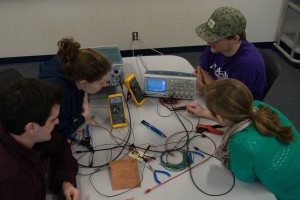In the early 19th century, Louis Braille invented a method of communication for the blind and sight-impaired. Today in the School of Engineering and Applied Science at Gonzaga University, four students are attempting to revolutionize the way people access his invention.
It all began when Joe Wilson (’16), an electrical engineering major from Post Falls, Idaho, was working with a blind student through Gonzaga’s Disability Access office in the fall of 2013. Wilson noticed that access to academic materials was limited for sight-impaired students. Audio books could be inconvenient at times and paper braille materials could be cumbersome—even when using contracted braille (a sort of braille shorthand), the raised bumps can take up more space on a page than most standard type, making some already lengthy books nearly impossible for students to carry around and quite cost prohibitive—so Wilson assembled a team that would endeavor to build a more convenient solution.
Wilson is working as a team with computer engineering student Ingrid Stansberry (’16) from Lewistown, Mont., computer engineering student Caitlin Croskrey (’16) of Spokane, Wash., and mechanical engineering major Mark Rawson (’16) from Sammamish, Wash., on a capstone project through the Gonzaga Center for Engineering Design & Entrepreneurship and the KEEN Foundation to create a manageable tablet-style electronic device that can display a full page of refreshable braille—like an iPad with a tactile screen. In addition to building the device, these students will also create a business plan, research marketing strategies and product promotion.
 Along with their enthusiasm for the project, each member of the team brings a unique perspective and inspiration for choosing engineering as an area of study at Gonzaga. Stansberry found computer programming to be the most fun class she’d ever taken, and believed that computer engineering would present an exciting challenge. As a young child, Rawson was fascinated with taking things apart to understand how they worked, which made mechanical engineering a natural fit. Wilson is excited by the broad variety of potential uses for electronic technology. Croskrey’s inspiration came from her father, who also has an engineering background.
Along with their enthusiasm for the project, each member of the team brings a unique perspective and inspiration for choosing engineering as an area of study at Gonzaga. Stansberry found computer programming to be the most fun class she’d ever taken, and believed that computer engineering would present an exciting challenge. As a young child, Rawson was fascinated with taking things apart to understand how they worked, which made mechanical engineering a natural fit. Wilson is excited by the broad variety of potential uses for electronic technology. Croskrey’s inspiration came from her father, who also has an engineering background.
“He spent many hours explaining the workings and technical details of various devices to me,” she recalled. “That fostered in me a love of learning and a desire to understand how an object functions—what makes it ‘tick.’”
If the complexity of and commitment required of the team for this project weren’t enough, they each have a unique set of interests that go beyond engineering. Wilson enjoys archery, Rawson serves as a GU Outdoors guide and photographer for the Gonzaga Bulletin, Croskrey Scuba dives and considers the time she spends researching antennas in Gonzaga’s Smart Antenna and Wireless Lab to be a hobby.
“I’m a collegiate rower,” said Stansberry, adding “that and school are about all I have time for.”
It’s no surprise that this project is occupying a lot of these students’ time. It is a tremendous undertaking, being that such a device has yet to be successfully built.
“Making our concept a reality is the overlying biggest challenge,” said Wilson, who admitted, “Also, high voltage electronics can kill you—meaning that this project is moderately dangerous.”
The commitment of time and energy, along with all of the safety considerations the team employs are worth it to these dedicated students. The benefits of their work has the potential to be far-reaching with its impact among the braille-reading community. Plus, they’ve had a bit of fun along the way.
“This project has been a blast for all of us,” said Wilson. “We are each highly motivated and work well together.”
Projects like this are made possible through partnerships with organizations and individuals throughout the community. If you would like to discuss the possibility of working with a Gonzaga School of Engineering and Applied Science senior capstone project team please contact Toni Boggan at boggan@gonzaga.edu or 509-313-3913.
